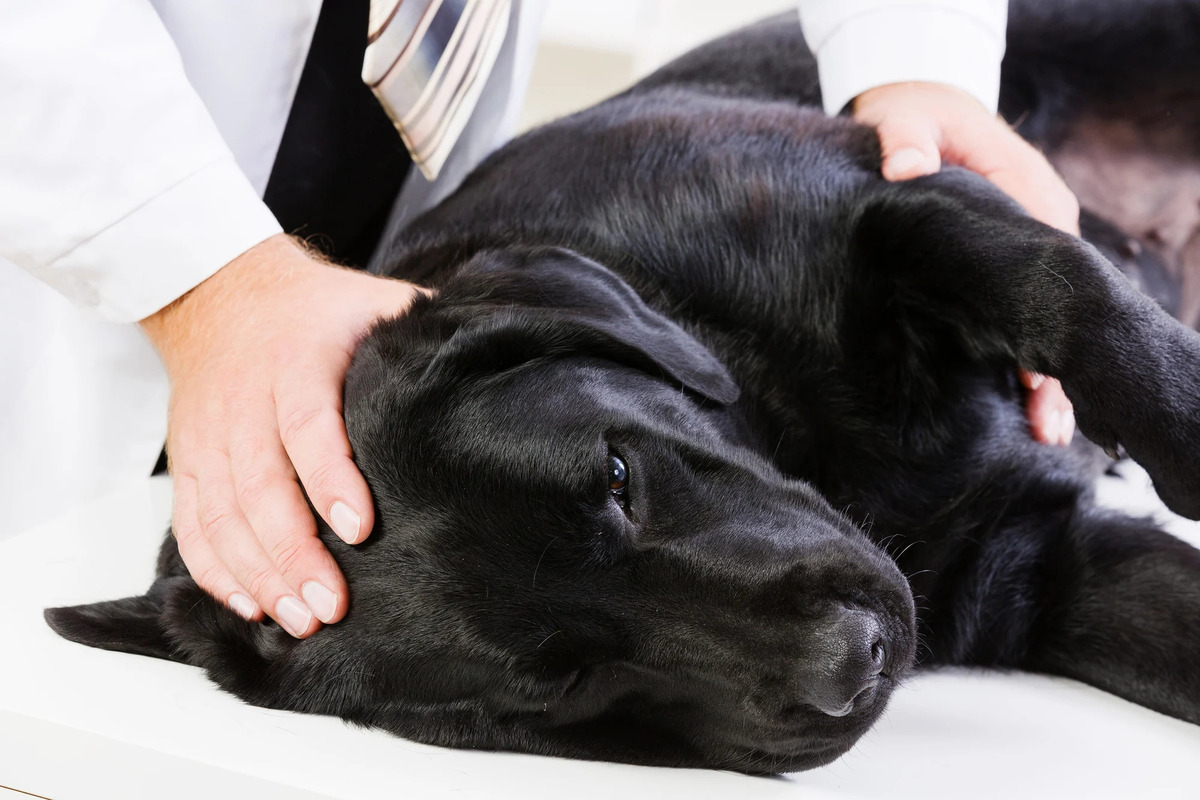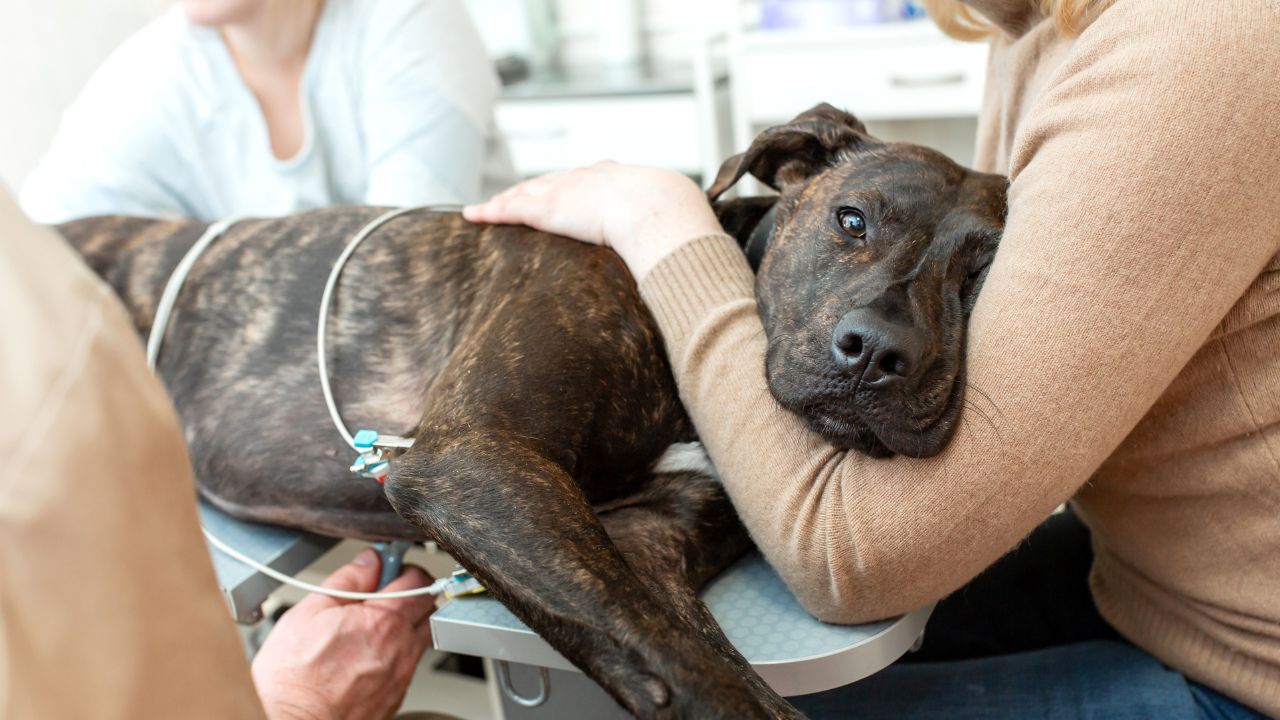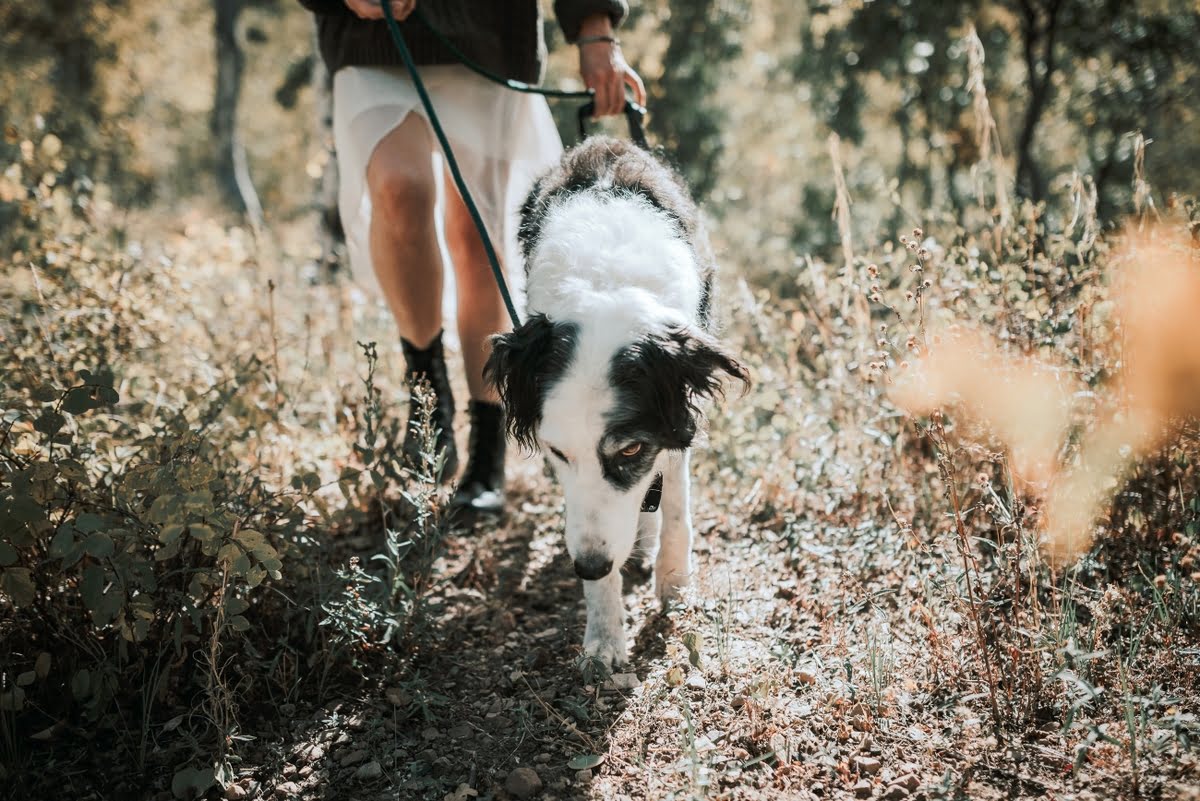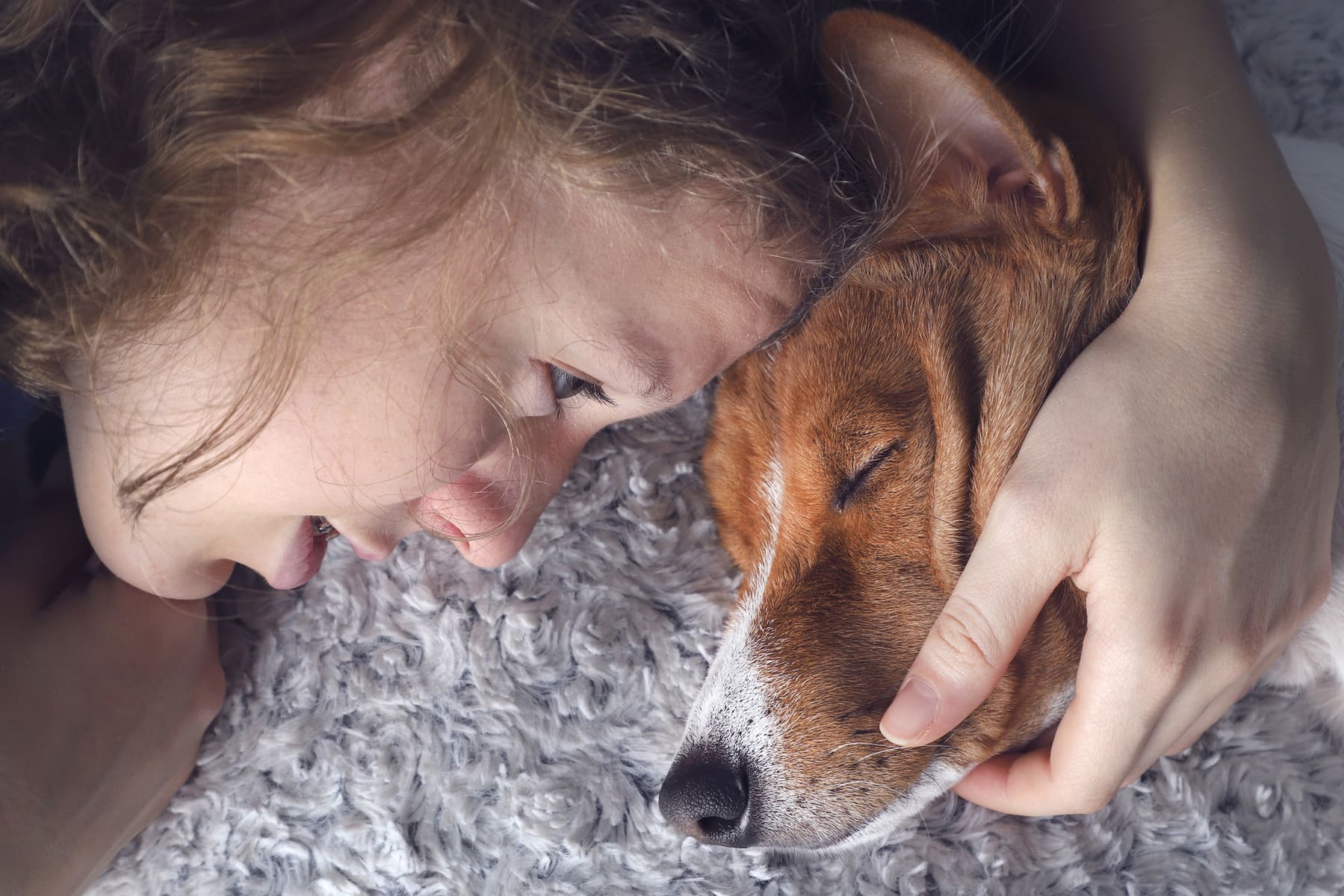Home>Health & Wellness>Behavior & Cognitive Care>How Likely Would A Senior Dog Have Side Effects To Gabapentin


Behavior & Cognitive Care
How Likely Would A Senior Dog Have Side Effects To Gabapentin
Published: February 1, 2024
Discover the likelihood of senior dogs experiencing side effects from Gabapentin and how it impacts their behavior and cognitive care. Learn more about managing potential effects.
(Many of the links in this article redirect to a specific reviewed product. Your purchase of these products through affiliate links helps to generate commission for Pawsomeoldies.com, at no extra cost. Learn more)
Table of Contents
Introduction
As our beloved canine companions age, they may encounter various health challenges that require careful attention and treatment. One common issue among senior dogs is chronic pain, which can significantly impact their quality of life. In such cases, veterinarians may prescribe medications to alleviate discomfort and improve mobility. One such medication that is increasingly used in veterinary care is gabapentin.
Gabapentin, originally developed for human use, has found its way into the realm of veterinary medicine due to its effectiveness in managing chronic pain and neurological conditions in dogs. However, like any medication, gabapentin is not without potential side effects, especially in senior dogs. Understanding the implications of using gabapentin in older canine companions is crucial for pet owners and caregivers to make informed decisions about their pets' well-being.
In this article, we will delve into the world of gabapentin and its impact on senior dogs. We will explore the mechanism of action of gabapentin, its common uses in senior dogs, and the potential side effects that may arise. Furthermore, we will discuss the factors that can influence the likelihood of senior dogs experiencing side effects from gabapentin. By shedding light on these aspects, we aim to provide valuable insights for pet owners and caregivers who are navigating the complexities of senior dog care.
The journey of caring for a senior dog can be both rewarding and challenging, and it is essential to equip ourselves with knowledge and understanding to ensure the best possible outcomes for our furry companions. Let's embark on this exploration of gabapentin and its implications for senior dogs, empowering ourselves with the information needed to make well-informed decisions regarding their health and well-being.
What is Gabapentin and How Does it Work?
Gabapentin, a medication commonly prescribed for dogs, belongs to the class of anticonvulsant drugs. Originally developed for human use, it has gained popularity in veterinary medicine for its efficacy in managing chronic pain and neurological conditions in dogs, particularly senior dogs experiencing discomfort and mobility issues.
The mechanism of action of gabapentin revolves around its interaction with the nervous system. Unlike traditional pain medications, such as nonsteroidal anti-inflammatory drugs (NSAIDs), which primarily target inflammation, gabapentin operates by modulating the activity of certain neurotransmitters in the brain. Specifically, it binds to the alpha-2-delta subunit of voltage-gated calcium channels in the central nervous system, thereby inhibiting the release of excitatory neurotransmitters. This modulation helps reduce the transmission of pain signals and may exert a calming effect on the nervous system.
In the context of senior dogs, gabapentin's ability to alleviate chronic pain and discomfort is particularly valuable. As dogs age, they are more prone to conditions such as osteoarthritis, degenerative joint disease, and neuropathic pain, all of which can significantly impact their mobility and overall well-being. Gabapentin's mechanism of action makes it well-suited for addressing these issues, providing relief from persistent pain and improving the quality of life for senior dogs.
Furthermore, gabapentin's versatility extends beyond pain management. It has been utilized in the treatment of seizures, anxiety-related disorders, and certain behavioral issues in dogs. This broad spectrum of applications underscores the multifaceted nature of gabapentin's pharmacological effects, making it a valuable tool in the comprehensive care of senior dogs facing various health challenges.
In summary, gabapentin operates by modulating neurotransmitter activity in the central nervous system, thereby mitigating pain signals and potentially exerting a calming influence. Its unique mechanism of action positions it as a valuable therapeutic option for addressing chronic pain, neurological conditions, and behavioral issues in senior dogs, contributing to an improved quality of life for our aging canine companions.
Common Uses of Gabapentin in Senior Dogs
Gabapentin has emerged as a versatile and valuable medication in the realm of senior dog care, offering a range of applications that cater to the unique needs of aging canine companions. One of the primary common uses of gabapentin in senior dogs is the management of chronic pain associated with age-related conditions such as osteoarthritis, degenerative joint disease, and neuropathic pain. These debilitating conditions can significantly compromise a senior dog's mobility and overall comfort, impacting their ability to engage in daily activities and diminishing their quality of life. Gabapentin's ability to modulate pain signals in the central nervous system makes it an effective tool for alleviating persistent discomfort and enhancing the well-being of senior dogs.
In addition to pain management, gabapentin is often prescribed to senior dogs experiencing seizures, a condition that can become more prevalent with age. The anticonvulsant properties of gabapentin make it a valuable asset in controlling and reducing the frequency and severity of seizures in senior dogs, thereby promoting greater stability and minimizing the potential adverse effects of recurrent seizure activity.
Furthermore, gabapentin has shown promise in addressing anxiety-related disorders and certain behavioral issues in senior dogs. As dogs age, they may experience heightened anxiety, cognitive dysfunction, or behavioral changes that warrant intervention to ensure their emotional well-being and overall stability. Gabapentin's ability to modulate neurotransmitter activity and exert a calming influence on the nervous system can aid in managing these behavioral challenges, contributing to a more balanced and comfortable state for senior dogs.
Moreover, in palliative care for senior dogs with terminal illnesses or end-of-life conditions, gabapentin may be utilized to enhance their comfort and alleviate distressing symptoms. By providing relief from pain, anxiety, or neurological discomfort, gabapentin plays a supportive role in ensuring that senior dogs facing complex health challenges can experience a greater sense of ease and tranquility during their twilight years.
In summary, the common uses of gabapentin in senior dogs encompass pain management for age-related conditions, seizure control, addressing anxiety-related disorders and behavioral issues, and providing supportive care in palliative settings. This multifaceted utility underscores the significance of gabapentin in catering to the diverse needs of senior dogs, contributing to their overall well-being and enhancing their quality of life as they navigate the complexities of aging.
Potential Side Effects of Gabapentin in Senior Dogs
While gabapentin serves as a valuable tool in managing various health conditions in senior dogs, it is essential to be mindful of the potential side effects that may arise from its administration. Understanding these potential adverse effects is crucial for pet owners and caregivers to monitor their senior dogs' well-being and make informed decisions regarding their care.
One of the primary concerns associated with gabapentin use in senior dogs is the possibility of sedation or drowsiness. This can manifest as lethargy, reduced activity levels, and an overall subdued demeanor in affected dogs. While some degree of sedation may be desirable in managing anxiety or promoting relaxation, excessive drowsiness can impede a senior dog's normal daily activities and diminish their quality of life.
Additionally, gastrointestinal disturbances, such as vomiting, diarrhea, or decreased appetite, may occur as a result of gabapentin administration. Senior dogs may exhibit signs of gastrointestinal discomfort, which can lead to nutritional imbalances and dehydration if not promptly addressed. Monitoring their food intake, bowel movements, and overall digestive health is essential to identify and manage these potential side effects.
Another noteworthy consideration is the potential for ataxia or loss of coordination in senior dogs receiving gabapentin. Ataxia can manifest as unsteadiness, stumbling, or difficulty maintaining balance, posing a risk of falls or injuries for senior dogs, especially those already grappling with mobility challenges due to age-related conditions.
Furthermore, some senior dogs may experience behavioral changes, such as increased agitation, confusion, or disorientation, as a result of gabapentin administration. These alterations in behavior can be distressing for both the dogs and their caregivers, necessitating careful observation and proactive measures to address any emerging concerns.
It is important to note that while these potential side effects are worth considering, not all senior dogs will experience them, and the severity of adverse effects can vary among individuals. Additionally, the likelihood and intensity of side effects may be influenced by factors such as the senior dog's overall health status, concurrent medications, and the dosage of gabapentin administered.
By remaining vigilant and attuned to their senior dogs' responses to gabapentin, pet owners and caregivers can collaborate with veterinarians to mitigate potential side effects and optimize the therapeutic benefits of this medication. Open communication with veterinary professionals and proactive monitoring of senior dogs' well-being are pivotal in navigating the complexities of gabapentin use in senior canine companions.
In summary, while gabapentin can yield significant therapeutic advantages for senior dogs, it is essential to be mindful of potential side effects, including sedation, gastrointestinal disturbances, ataxia, and behavioral changes. By staying informed and observant, pet owners and caregivers can ensure the well-being of their senior dogs while harnessing the benefits of gabapentin in enhancing their quality of life.
Factors Affecting the Likelihood of Side Effects in Senior Dogs
The likelihood of senior dogs experiencing side effects from gabapentin can be influenced by various factors, encompassing the dog's individual characteristics, health status, medication regimen, and environmental considerations. Understanding these factors is pivotal in optimizing the safety and efficacy of gabapentin use in senior canine companions.
Read more: Getting A Puppy When You Have A Senior Dog
1. Health Status:
The overall health status of a senior dog plays a significant role in determining the likelihood of experiencing side effects from gabapentin. Dogs with pre-existing medical conditions, such as liver or kidney disease, may be more susceptible to adverse effects due to potential alterations in drug metabolism and excretion. Additionally, senior dogs with compromised organ function may require dosage adjustments or closer monitoring to minimize the risk of side effects.
2. Concurrent Medications:
Senior dogs often receive multiple medications to manage various health concerns, and the interaction between gabapentin and other drugs can impact the likelihood of side effects. Certain medications may potentiate or mitigate the effects of gabapentin, influencing its overall safety profile. Collaborative management by veterinary professionals is essential to assess potential drug interactions and tailor treatment regimens accordingly.
3. Dosage and Administration:
The dosage of gabapentin administered to senior dogs is a critical determinant of the likelihood of side effects. Proper dosing based on the dog's weight, age, and specific health conditions is essential to minimize the risk of adverse effects while ensuring therapeutic efficacy. Moreover, the frequency and timing of administration can influence the dog's response to gabapentin, warranting careful adherence to prescribed protocols.
4. Individual Sensitivity:
Each senior dog may exhibit varying sensitivity to medications, including gabapentin. Factors such as genetic predispositions, metabolic variations, and individual tolerance levels can contribute to differences in the likelihood and intensity of side effects. Close observation of the dog's response to gabapentin is essential to identify and address any idiosyncratic reactions promptly.
Read more: What Would A Service Dog Do For Arthritis?
5. Environmental Factors:
The living environment and daily routines of senior dogs can impact their response to gabapentin. Factors such as stress levels, environmental stimuli, and social interactions can influence the dog's overall well-being and may interact with the effects of gabapentin. Creating a supportive and comfortable environment for senior dogs can contribute to minimizing potential stress-related responses and enhancing the medication's safety profile.
By considering these multifaceted factors, pet owners and caregivers can collaborate with veterinary professionals to tailor gabapentin therapy to the specific needs and characteristics of their senior dogs. This personalized approach, coupled with attentive monitoring and proactive management, can mitigate the likelihood of side effects and optimize the therapeutic benefits of gabapentin in enhancing the well-being of senior canine companions.
Conclusion
In conclusion, the utilization of gabapentin in senior dogs presents a multifaceted landscape, encompassing its diverse therapeutic applications, potential side effects, and the interplay of various factors influencing its safety and efficacy. As pet owners and caregivers navigate the complexities of senior dog care, understanding the implications of gabapentin is pivotal in ensuring the well-being and quality of life of aging canine companions.
Gabapentin, with its unique mechanism of action in modulating neurotransmitter activity, serves as a valuable tool in managing chronic pain, neurological conditions, and behavioral challenges in senior dogs. Its ability to alleviate discomfort, control seizures, and promote emotional stability contributes to enhancing the overall quality of life for aging canine companions. However, it is essential to remain mindful of potential side effects, including sedation, gastrointestinal disturbances, ataxia, and behavioral changes, which may impact senior dogs' well-being.
The likelihood of senior dogs experiencing side effects from gabapentin is influenced by a myriad of factors, including their individual health status, concurrent medications, dosage and administration, individual sensitivity, and environmental considerations. By taking a personalized and attentive approach to gabapentin therapy, pet owners and caregivers can collaborate with veterinary professionals to tailor treatment regimens that minimize the risk of adverse effects while maximizing the therapeutic benefits for their senior dogs.
As we embark on the journey of caring for senior dogs, it is imperative to foster open communication with veterinary professionals, remain vigilant in monitoring our canine companions' responses to gabapentin, and create supportive environments that promote their overall well-being. By integrating knowledge, compassion, and proactive management, we can navigate the complexities of gabapentin use in senior dogs, empowering ourselves to make informed decisions that prioritize the health and happiness of our aging furry friends.
In essence, the judicious use of gabapentin in senior dogs, guided by a comprehensive understanding of its applications, potential side effects, and influencing factors, enables us to provide tailored and compassionate care for our aging canine companions. By embracing this holistic approach, we can embrace the journey of senior dog care with confidence, empathy, and a commitment to optimizing their well-being as cherished members of our families.













